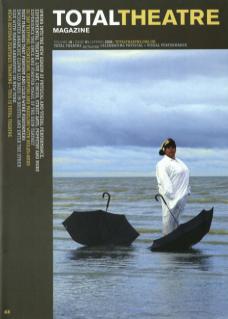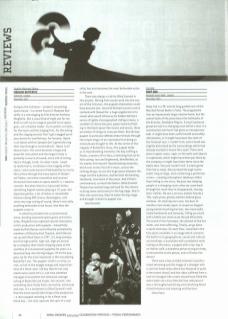Going to the Coliseum – London's second big opera house to review Puccini's Madame Butterfly in a new staging by film director Anthony Minghella. Not a usual kind of night out for me. Note to self: try to imagine yourself as an opera goer, not a theatre-maker. Try to watch, to listen, for the music and the singing first, for the acting and the staging second. Don't get snagged up on your desire for truthfulness, for honesty. Opera is all about artifice (people don't generally sing their way through a conversation). Opera is all about music: the voice becomes a huge and powerful instrument and the singer's body is primarily a source of sound, not a site of acting. Fact is though, truth: it's what I want. I want to really feel it, to believe in the tragedy of the story; I want some kernel of believability to rise to the surface through the many layers of theatrical fakery, narrative convention and musical formalism that make an opera what it is. I want to connect. But when there's a (very late) thirty-something English woman playing a fifteen year-old Japanese geisha, a lot of ladies in remarkable kimonos doing ENO chorus shenanigans, and some very ropey acting all round, there's not really anything believable to be found. And then the puppets come in.
In what has proved to be a controversial move, dividing seasoned opera goers and critics alike, Minghella has replaced several characters in this production with puppets – beautifully made by Nick Barnes and brilliantly animated by members of Blind Summit Theatre, which Barnes set up with Mark Down in 1997. It's long overdue, but this high profile, high risk, high art arrival by a company that's been chipping away at the coalface of conventional puppetry for years is a deserved leap into the big league. Of all the puppets, by far the most important is the one playing Butterfly's son. This puppet-child is so alive, so real, so full of the wriggly energy and inquisitiveness of a three year-old boy that he not only steals every scene he's in, but also somehow manages to transform the otherwise average acting of Butterfly and Suzuki, her servant, into something that finally feels connected, emotional and true. It's a testament to Blind Summit's skill that the most totally fake thing in the production – resin puppet standing in for a flesh-and-blood boy – not only captures the spirit of a real child, but also becomes the most believable actor in the cast.
There was always a risk for Blind Summit in this project. Moving from studio work into the cavern of the Coliseum, the puppets themselves could have become lost. And with Michael Levine's set to contend with (beautiful: a huge angled mirror to reveal what would otherwise be hidden behind a series of tightly choreographed sliding screens, a snowfall of cherry blossom, paper lanterns floating in the black space like moons and stars), there are plenty of things to consume them. But the boy puppet in particular defeats these threats through the simple magic of an inanimate form being so miraculously brought to life. At the centre of the tragedy of Butterfly's story, this puppet leads us to heartbreaking moments: the boy sniffing a flower, unaware of his fate; a twitching foot as he falls asleep, lost and frightened, blindfolded, as his mother kills herself. Heartbreaking moments, which soar across Puccini's music, across the striking design, across the huge space between the stage and the audience, and become the beating, shattered, true heart of the piece. And if that's controversial, so much the better. Blind Summit Theatre has worked long and hard for the chance to bring some controversy to the big stage. And in their own quiet way, they've taken the big stage and brought it down to puppet size.

